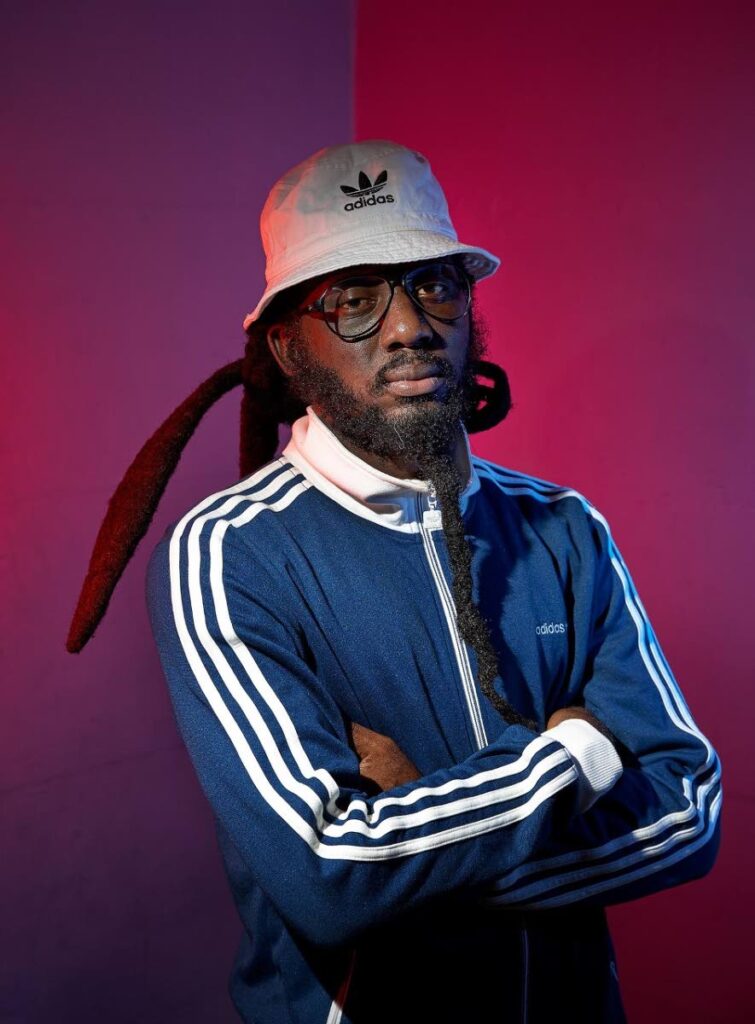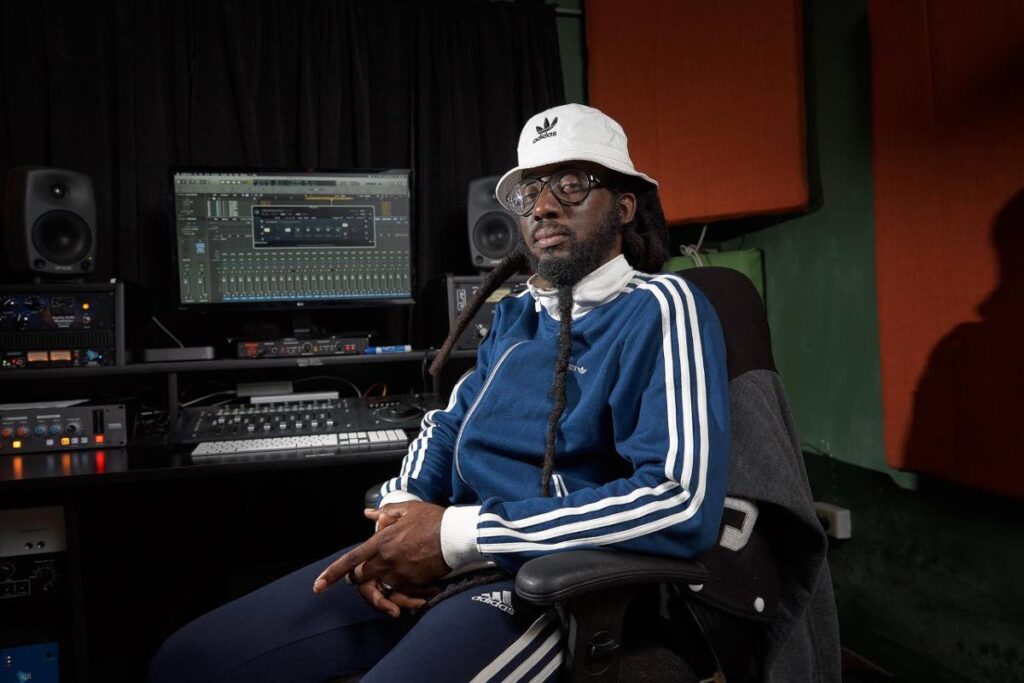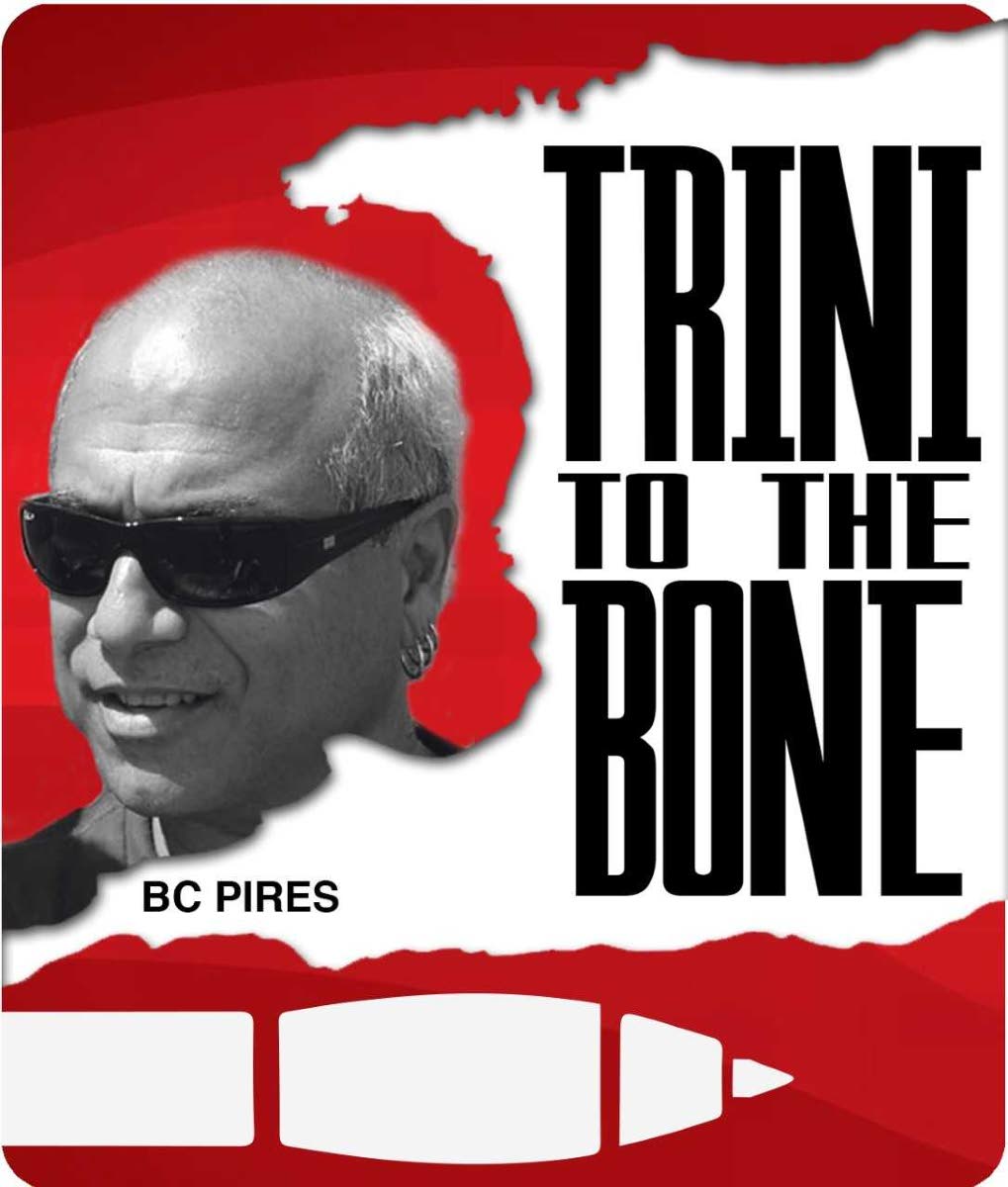Space for six hearts

AS TOLD TO BC PIRES
Because Trini to the Bone is a feature on individuals, all six members of Freetown Collective will appear one by one over six weeks, starting on May 30 with one co-founder, Lou Lyons, and ending with the other co-founder, Muhammad Muwakil, on July 4.
My name is Lou Lyons and I am the co-founder and one of six members of Freetown Collective.
I am a singer, songwriter, guitarist and producer.
Originally from Pembroke, Tobago, I lived there until I was 21.
I now live in Tunapuna.
Both places shaped the person speaking in the present tense.
There was deliberately no television at home in Pembroke because my parents wanted to cultivate a culture of intellectualism and reading.
I come from a classic nuclear family, mum, father, one sibling.
But my grandparents were directly in the next yard. And my cousins and uncles in the next village over.
I have a family myself, my wife Nickeisia and daughter Naeema Lyons.
Music was the first thing I developed a fantasy towards.
My father would tell me, “Don’t touch my records!” But when he was out, I would be listening to his soul, and R&B LPs.
I’m actually named after one of my parents’ favourite musicians, Lou Rawls, a baritone.
Barry White is probably my favourite of my parents' musicians.
There is something about this heavyset black man dripping with Jheri curls, grease on his face, conducting a 24-piece orchestra. What gives you the right to take soul music and make it symphonic?
I was just drawn to that. I hear the influence of his music in my writing voice to this day.
At school, I hated maths. But I’ve since grown to believe in the language of maths. I read everything I can about maths. I ask anyone good at maths mathematical questions. I believe the only true language is mathematics. It explains everything, music, art even language itself! That mathematical precision of our existence screams of a divine order.
Whoever we ascribe that divine order to is what some of us would call God.
I grew up Seventh-Day Adventist, mostly vegan. In Pembroke, we ate the stuff we planted, from the soil to the table. And I absolutely hated it.
But I am thankful that I had that I had that early diet.
Of course I rebelled. I had and loved a whole meat-eating chapter of life.
But I returned to being vegan more because giving up something you enjoy instilled in me a certain level of discipline.
Today, I am closer to Rastafari than Seventh-Day.
But there is a lot of commonality between all religions.
One of the first novels I read and really enjoyed was Moby-Dick.
My father insisted we read The Autobiography of Malcolm X and write a book report on it, to prove we’d read it.
But I'm kind of ashamed to admit the book that had the biggest impact on me was Think Big by Dr Ben Carson. Yes,
that Dr Ben Carson. Yes,
Trump’s Dr Ben Carson.

But the book is good. Anybody who feels their beginnings might be a disadvantage to their aspirations, that book helps you break down your big aspirations into smaller steps, short-term attainable goals that lead to the big ones.
That was a very valuable lesson for me to learn early in life.
My father came back from the States with a Jet magazine with Shabba Ranks on the cover.
It was the first time I saw someone you might call “black and ugly” but famous. And I said to myself, “Whatever he is doing, I want to do that!” Because he wore his skin so comfortably.
And from there, I developed this deep-deep fantasy of becoming a musician.
But then I did law.
My mother saw one of these programmes you could send your children to and it would build a character.
The facilitator said, “You are not a bad child, what are you doing here?”
I told him I couldn't find a job because I’d failed maths. But I could write.
The facilitator introduced me to Earl Manmohan and Keith Smith, who told me I should take writing seriously. I started journalism at COSTAATT. It was a safe place, away from maths.
Kerwyn Pyle-Williams, an ethics lecturer, told me, “Listen, people does kill journalists. And the way you approach this course, you want to make some revolutionary impact. Try your hand at law.”
That’s how I ended up a lawyer, ‘cause he sold it to me as more philosophy.
My exit from law came when I realised justice was more procedural than philosophical.
I got disheartened. The flame went out. I went back to music.
I have some regrets. But leaving law is not one of them.
Initially I was not cast in the film God Loves the Fighter, in which I had what BC Pires calls the mesmerising opening scene.
I would show up on set to see Muhammad's rendition. Director Damiam Marcano needed the truth to be told from an unlikely point of view.
The rendition of the vagrant at the opening of God Loves the Fighter was cathartic.
At that point, I didn't drink. But I said, “Hey, Damian, you have any rum?”
To get that catharsis going, to put my present self of shame and embarrassment in the back and just allow the pent-up stress and frustration with society to come out, I took two healthy mouthfuls of white rum and just let it come out.
None of that opening monologue is scripted.
I was at an open mic at Sky Bar on the Avenue and Muhammad came on – and he was completely explosive! Who was this young fella with this big beard just being, you know, “for spite!”
That night, we spoke to each other for about three hours.
And then didn't see each other again for years.
One night, around 2007 or 2008, at UWI to study, I saw him setting up mikes and I said, “Wait! You’s that fella!”
And he said, “Wait! You’s that guy!”
And that was it. We linked back up and started performing spoken word together.
Muhammad had a song called Love Transition.
The first time I heard it, he could just barely play guitar. I have a very personal relationship with music. I can listen and appreciate with my ears and my intellect– but there is something very visceral that happens in my stomach, in my gut, and I can't control that. Every time that flip happens, I have leaned heavily in that direction.
When I heard Muhammad sing that song for the first time, I felt that flip. And leaned into it. I told him that was one of the best-written songs I had ever heard in my life and asked if I could put a verse on it.
And the rest is history.
The best part of Freetown is we all get to grow in plain sight of each other without censorship. You get to f--k up. And you get to test the forgiveness that others claim to live by.
We talk a lot about love – and I get why to some people that could seem very airy-fairy – but the truth is that gospel that we preach gets tested a lot internally.
And we get the opportunity to mean what we say.
And not all the time it is pretty.
Having these three women in the band contributed heavily to us maturing.
When they first joined, the level and kind of communication they need, the follow-up and certainty they need, in a closed workspace, we didn’t know nothing ‘bout that!
When it was just me and Muhammad, it was, ‘Hey, we have a gig, you could call me five minutes before.’
When we tried to operate on that level, it was violent towards them.
Me and Mud would go up to Never Dirty and perform on the basketball court. But three young women need time to wrap their minds around the spaces we go into (without thought)!
You have to move and think differently.
The bad thing about being in Freetown is that the incubator isn't always a true microcosm of life. Muhammad and I are not aware of when it is an echo chamber.
I really don’t know what a Trini is. I find it easier to describe a Caribbean. A Carib-being, or a Caribbean person is anybody who came here by whatever means who has been challenged with the job of self-determination.
(Most) countries have enough history that they can build on their predecessors. To be a Caribbean is to almost share the same work as your predecessors.
Except perhaps in literature, where Naipaul and Walcott rank with the best.
Within the last three years, my love for Trinidad and Tobago has stemmed from understanding that we are a very sentient people, quite intellectual and deliberate with how we would like to be portrayed.
The founders of our country were so deliberate, they printed what they saw as the fabric of the society on the money: Together we aspire, together we achieve is literally the secret to success!
Read the full version of this feature on Friday evening at www.BCPires



Comments
"Space for six hearts"